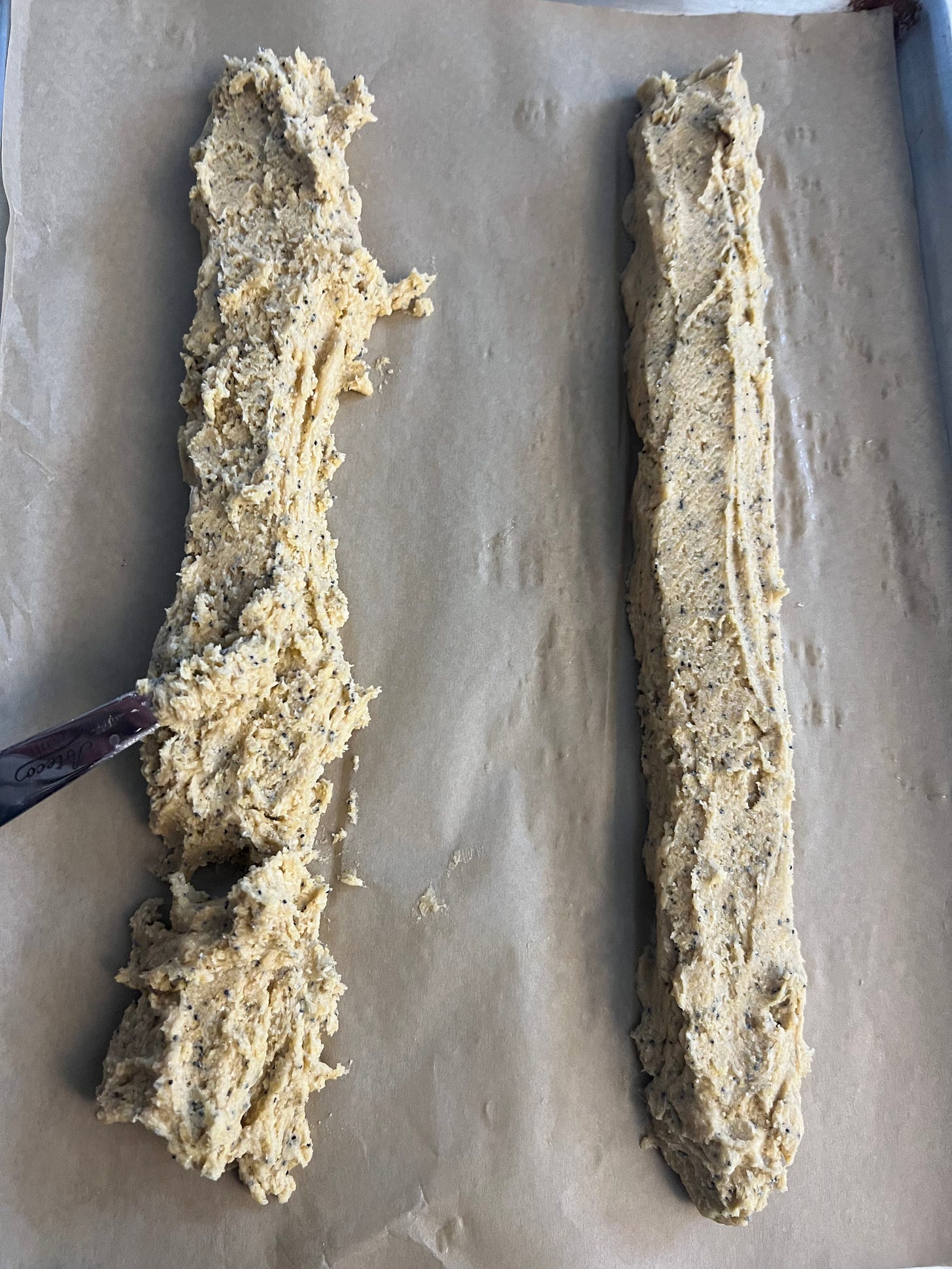Issue #107: Ageless Biscotti
Back at World's 50 Best, Women's Empowerment, Preserved Lemon and Poppyseed Biscotti
Over the last few days I’ve had too much food and too little sleep, so forgive me if anything below is nonsensical. I finished this week’s newsletter on the plane home from Europe, which is why it has arrived in your inbox just a little bit later than usual today. Remember there are just a few days left until June 30, when my special promotion on annual subscriptions (including a free signed copy of my Kitchen Sense cookbook) ends. Thanks for your continued support.—Mitchell
¡Hola! Greetings from Spain. València, to be more exact. From here I should be writing about this region’s beloved paella valenciana, typically made with rabbit, chicken, beans, and the region’s famous Albufera rice, all cooked over a wood-burning fire. But now that I’ve experienced several different versions of paella on this trip, I feel I need to get home and work on my own recipe. Stay tuned. In the meantime, I’m going to give you something totally different, a recipe for preserved lemon and poppyseed biscotti. I made these cookies to bring as a gift to thank my friend Evelyn, who helped make many of our dining arrangements in and around Valencia. More on both the biscotti and the trip, below.
I was in Valencia for the World’s 50 Best restaurant awards, that annual party of a certain cadre of chefs that some liken to an exclusive, self-congratulatory club. Many of the criticisms of this list are justified, foremost the notion that this tiny sliver of restaurants could ever fully represent, let alone accurately rank, the amazing food and hospitality offered by thousands if not millions of great restaurants around the globe. But that doesn’t mean the exposure given doesn’t create some powerful, inspiring, and emotionally resonant moments, both for those on it and those watching.

Historically, it’s also been a boy’s club. But #imho, this year it was a woman who stole the show during the World’s 50 Best Talks. Nola Fitzgerald Belahcen is founder of the Amal Association for the Culinary Arts in Marrakech, a nonprofit that provides professional culinary training to empower and lift women out of poverty. What began more than 10 years ago after a chance encounter with a woman who didn’t have enough money to feed her two children has grown into a social enterprise with three restaurants and a training center in Marrakech that has redirected the lives of more than 300 women into professional kitchens.
“I realized these women didn’t need to be ‘saved,’” Belahcen told the audience of the top chefs and food journalists from around the world, some of whom think they are saving the world simply by feeding their affluent clientele. “Instead, I began to see them as experts in their own right, experts in living through adversity, experts in dealing with scarcity. And once you see them as experts, you look at them differently, you have to treat them with respect.” Belahcen began this project without any experience at all in kitchens or restaurants. But she could see the power of food and cooking as a mode of transformation for these women for whom food was such an important and constant focus.
In a talk that was equal parts moving and inspiring, Belahcen shared her vision, her challenges, and he successes. One day she realized that none of the women working in her kitchens had ever eaten in a restaurant. To correct that, dining out became part of the training as a way to increase both understanding and dignity. She told the story of accepting a cohort of deaf women to train, and how her staff had to learn sign language in order to teach them. Upon completion of the program, no restaurant would hire these proficient women, who happened to be deaf, so she opened a café where they all could work.
Of course, there were other emotionally resonant moments during the World’s 50 Best festivities. The pride of the chefs from Latin America, which fared particularly well in this year’s ranking—Central in Lima came in #1, Elena Reygadas from Mexico City was named Best Female Chef, and Pia Salazar from Quito, Ecuador, was named Best Pastry Chef—was particularly infectious. I was personally overjoyed that Ellia and JP Park’s Atomix landed at #8 on the list, receiving the “Highest Climber” award (they were #33 last year) and the “Highest in North America” honor (the only other restaurant in the U.S. on the list is Le Bernardin at #44). Although winners at this ceremony do not get to give speeches, you could see Ellia was crying on stage as the audience cheered. Even the M.C.’s script noted the humility with which the couple operate their businesses. You can see the entire 2023 list here.
But back to the kitchen and to the biscotti.

I’ve been making variations of this biscotti since I wrote my first cookbook, Cook Something, back in 1995. That book was a combination of things I cooked and a collection of recipes from friends. The recipe for these buttery, crunchy, twice-baked cookies was contributed by my friend Carrie Pillar (née Weiner), who had worked in the pastry kitchen of Patina, one of the hottest restaurants in Los Angeles during the 1990s. She later came to work at the James Beard Foundation for a stint. (It’s hard to believe Carrie now has an adult son, Cole, who lives around the corner from me in New York. Where does time go?) I still love these cookies.
At the time I wrote Cook Something, my editor wanted me to explain what biscotti were, how they are an Italian cookie baked twice to make them crisp, and how they are traditionally dunked in coffee or wine to soften them up to eat. Almost 30 years and billions of biscotti sold in coffee shops across America later, I think we can assume most people are familiar with the category. However, these biscotti are nothing like the dry, tooth-breaking slabs of tasteless stone that have become ubiquitous. They are buttery, crisp, friable, melt-in-the-mouth, and packed with flavor. What’s more, because they are dried, they will keep fresh an extra-long time in a sealed container at room temperature, up to a three weeks, and in the freezer, up to six months.

For this variation, I’ve used some preserved lemon paste, which along with the poppyseeds (both blue and white), contributes a savory quality that mitigates their sweetness. I use NY Shuk’s paste preserved lemon paste. It’s pricey, but a little goes a long way, and I’ve had the same jar in my fridge for years. But you can also make your own by puréeing a preserved lemon or two in a food processor or blender. You can also omit the preserved lemon and use additional zest. I like to add minced candied ginger sometimes, too. If you don’t have or can't find white poppy seeds, don’t worry, blue will do. So will sesame seeds, or whatever you like. One reason I’ve been making these biscotti for so long is the base recipe is so crunchy and flavorful—thank you, cornmeal—you can adapt it easily to different flavor combinations.
RECIPE: Preserved Lemon and Poppyseed Biscotti
1 ½ cups all-purpose flour
½ cup fine cornmeal
1 ½ teaspoons baking powder
Pinch salt
4 ounces (1 stick) unsalted butter, at room temperature
1 cup sugar
Zest of 1 lemon
1 tablespoon preserved lemon paste
½ teaspoon vanilla extract
2 eggs
1 tablespoon blue poppyseeds
1 tablespoon white poppyseeds
Line a sheet pan with parchment. In a medium mixing bowl, combine the flour, cornmeal, baking powder, and a small pinch of salt, and blend with a whisk. Set aside.
In the bowl of an electric mixer fitted with a paddle, beat the butter with the sugar, lemon zest, and preserved lemon paste until smooth, light, and fluffy. Beat in the vanilla, and then add the eggs, one at a time. Stir in the dry ingredients along with the poppyseeds just until mixed. Don’t over do it.
Using a large spoon or rubber spatula, spoon the dough onto the parchment-lined pans into two long logs, about 1 ½ inches wide by 12 inches long. Use a small offset spatula to smooth the surface and edges of the dough (See photo.) You can also moisten your fingers with cold water to help shape the logs. Refrigerate for about 30 minutes, or up to a day, to firm up. Preheat the oven to 325°F.
Remove the tray from the fridge and bake for 25 minutes or so, until the logs of dough have risen and spread and you can see fine cracks on the surface and a slight browning around the edges, all of which indicate the dough is cooked through. The logs should be firm to the touch. Remove and let cool for 10 to 15 minutes. Reduce the oven temperature to 275°F. Once cooled, carefully lift each log off of the parchment and onto a cutting board without breaking it. You may have to peel the paper off. Using a serrated knife, slice the logs on the diagonal about ½ inch thick and lay the slices cut side down back on the parchment lined tray. (Flip the parchment if it’s covered in too many crumbs.)
Return to the oven for about 15 minutes to dry out, then turn the cookies over so the other side is exposed, and dry out another 15 minutes or so. They shouldn’t brown. Remove from the oven and cool completely. The biscotti will keep crisp in an airtight container for about three weeks or in the freezer for up to six months.







Thank you, Mitchell! I finally have a use for that jar of preserved lemon paste I made last year. And thank you too for the report from the food awards. I have never paid much attention to them (I think I may have won an award once for some book of mine, is that possible?) but the work of the Moroccan woman you described is just totally heartening. Makes me want to hop a plane to Rabat tomorrow to see for myself. Incidentally, and slightly on point, Chef Lauren Radel, who's here to do a dinner at Nina June, just got back from a week or more in Armenia on a State Dept sponsored kitchen-hands-across-the-sea kind of program and raved about it--the food, the people, the kindness, the interest. It sounds like Morocco could be a good candidate for a similar exchange.